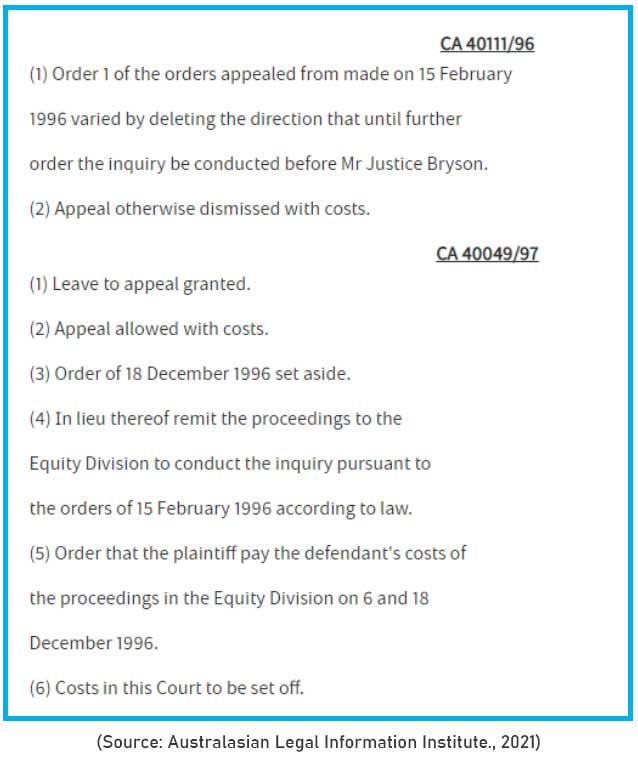
Contents
Brunninghausen v Glavanics [1999] Case Facts
In the case of Brunninghausen v Glavanics [1999] NSWCA 199 (23 June 1999), the appellant was Max Bernard Jules Brunninghausen while the respondent was Michael Glavanics. The concerned case was first held in the Court of Law in the year 1996 on 15 February and the second appeal was witnessed on 18 December 1996. Max Bernard Jules Brunninghausen and Michael Glavanics were brothers-in-law and shareholders as well as directors of a family-owned business. The appellant established a company in 1976 that imported ski equipment. The respondent assisted in setting up the business and thus, the appellant offered 1000 prepaid shares of the company valued at $ 1 to the defendant. On the other hand, the appellant held as much as 5000 issued shares of the company, and at that point in time, the parties to the case were the only directors of the business. In 1977, the appellant formed Skima Sportswear Pty Ltd with a similar operating aim as before and held 4,750 issued shares and offered 250 issued shares to the respondent without any cost. Subsequently, in 1983, the said relationship started to get ambiguous as the respondent was associated with another business that was competing with the initial company. Thereafter, the respondent decided to sell the shares back to the appellant. However, the appellant was already in negotiating terms with a third party to sell the business and confined the said information from the respondent. As a result, the value of the shares of the respondent was evaluated to be much more than he actually was able to receive.
Brunninghausen v Glavanics [1999] case decisions
The case was adjudicated by Priestley JA, Handley JA, and Stein JA and the lower court judicial officer was Justice Bryson. This case was filed in the Equity Division of New South Wales Court of Appeal which is a part of the Supreme Court therein. The verdict given out on 18th December 1996 was ruled in the favor of the defendant who is the respondent in this case which was appealed in 1999. In the previous or second judgment of the case, Brunninghausen (plaintiff) was ordered to compensate $300,000 for the breach of fiduciary duties (Australasian Legal Information Institute., 2021). In 1999, Brunninghausen appealed and challenged the previous judgments, wherein in the final decree, it was held that Priestley JA, Handley JA, and Stein JA relied on favor of the last decision thus incurred by Justice Bryson. In CA 40111/96 and CA 40049/97, the following was held:

Judgment as per CA 40111/96 and CA 40049/97
Impact of the decisions on director’s fiduciary duties
In general, a director owes fiduciary duties to the company and should be in pursuit of every act that would be in the best interest of the said organization. However, directors prior to this case were not acclaimed to decipher any fiduciary duty to the shareholders of the company. It was held in this case, that when the director of a business owns fiduciary duties towards shareholders, the said is likely to be held liable for harassing actions against minority shareholder(s); and thus, the hon’ble court held that the duty was existing in this case (Chen, 2019). This case thereafter sets a precedent that highlights that a director owes fiduciary duties to both company and shareholders. However, the said fiduciary duties owed by the director vividly overrule the duties thus owed towards the shareholders.

Fiduciary Director’s duties according to Corporation Act
Section 9 of the Corporations Act 2001 (Cth) enunciates the legal definition of directors and other officers which is vividly stated under section 179 of Part 2D.1 of Chapter 2D of the said Act. Subsequently, in Division 1 of the Act, the general duties of the directors and other such officers have been stated.
Sub-section 1 of Section 180 of the Corporations Act 2001 (Cth) enunciates that an individual who is the director or any other officer of a corporation requires to adhere by the appropriate degree of care and diligence that any reasonable person would have adhered to when striving to discharge the power and duties assigned to them.
Sub-section 2 vividly provides a business judgment rule perspective wherein, to sum up, it states a business judgment when made by such aforementioned officers requires to be made in good faith, without any personal interest, appears to be reasonable and appropriate to the decision-maker and in the best interest of the business (Hill, 2020).
Section 181 affirms that directors should perform their duties in good faith
Section 182 restricts the misuse of the position or power of such directors or officers.
Section 183 states that a director, officer, or employee, as they are in that position, gaining information should not use the same to their own benefit and deter from causing harm to the business as a whole ("7.3 Corporations Act 2001 (Cth) (the Corporations Act) - Welcome Aboard - Department of the Premier and Cabinet", 2021).
Section 184 states that when a person acts in adverse ways as prescribed in the above sections, it constitutes a criminal offense adhering to the provisions of this section.
Types of Breaches in Fiduciary Duties
In the light of the above discussion, the breaches of duties of the directors can be categorized under four major categories, as has been stated in sections 180 to 183 of the Corporations Act 2001 (Cth). Section 184 of the said Act affirms the remedies one may sort when there is a breach of such duties. Additionally, directors bear financial duties towards the corporation, however, this breach is not relevant to this case herein (Hill & Conaglen, 2018).
In this case of Brunninghausen v Glavanics (1999), the primary breach of duties as can be comprehended would be a breach of section 183 that affirms directors or officers of a company should not use any information gained in the due course of his or her position in the company and dealing with the processes of the company, to his or her own benefit. The appellant, in this case, has confined the information of negotiation of the sale of the company from the respondent, and thus, the shares that were sold to the appellant by the respondent were below the actual value. Reasonable prima facie cause herein can be affirmed to be that if the respondent would have had the knowledge of the ongoing negotiation of the sale of the company, the share issued to him would have been sold at a greater value, and therefore, the respondent was subjected to face loss in the due course of the actions. Conversely, the appellant, who was also the sole acting director of the company was able to draw more profit through this confinement of information and thus, used the information in question to his own benefit.
In Brunninghausen v Glavanics fiduciary duties that were breached
As has been discussed, a number of ethical as well as fiduciary duties on the part of the appellant i.e., Brunninghausen were held to be breached. The scope and nature of fiduciary duties in the given case though was not expressed vividly can be affirmed through a few precedent citations used in the cases such as Percival v Wright [1902] 2 Ch 401 fiduciary duties refer to as the relationship of trust and good faith that each party should bestow upon the other; especially in relationships between trustee and beneficiary (Salleh, 2021). Now, in this case, the duty on the part of the appellant was held in breach as it was found that the appellant, in this case, owed fiduciary duties towards the respondent. The appellant should have informed the respondent about the information of sale of the company as the respondent was long detached from the internal activities of the company and had no means of comprehending the actual value of the shares that he sold back to the appellant.
References
- 7.3 Corporations Act 2001 (Cth) (the Corporations Act) - Welcome Aboard - Department of the Premier and Cabinet. (2021). Retrieved 15 September 2021, from https://www.premiers.qld.gov.au/publications/categories/policies-and-codes/handbooks/welcome-aboard/member-duties/corp-act-2001-c.aspx
- Australasian Legal Information Institute. (2021). Supreme Court of New South Wales - Court of Appeal. Available at: http://www.austlii.edu.au/cgi-bin/viewdoc/au/cases/nsw/NSWCA/1999/199.html?context=1;query=Brunninghausen%20v%20Glavanics;mask_path [Accessed 15 September 2021].
- Chen, V. (2019). Enforcement of directors’ duties in Malaysia and Australia: the implications of context. Oxford University Commonwealth Law Journal, 19(1), 91-117.
- Hill, J. G. (2020). Shifting Contours of Directors' Fiduciary Duties and Norms in Comparative Corporate Governance. UC Irvine J. Int'l Transnat'l & Comp. L., 5, 163.
- Hill, J. G., & Conaglen, M. (2018). Directors’ duties and legal safe harbours: a comparative analysis. In Research Handbook on Fiduciary Law. Edward Elgar Publishing.
- Salleh, K. (2021). THE DUTIES AND CONFLICTS OF NOMINEE DIRECTORS: THE LEGAL POSITION IN MALAYSIA. Psychology and Education Journal, 58(2), 1577-1583.
